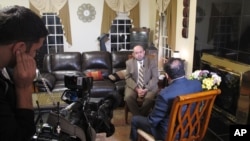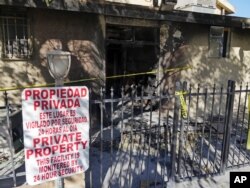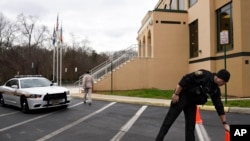American Muslims have been targeted in dozens of incidents with threats, physical attacks and vandalism following the December 2 shootings in San Bernardino, California, by Islamist extremists. Leaders in the Muslim community say the hate crimes are disturbing, but not surprising.
In New York, a man assaulted South Asian restaurant workers during an anti-Muslim rant. A woman is under investigation for a hate crime in Sacramento, California, after she struck and threw her coffee at two Muslim men at prayer in a park.
Windows were smashed and furniture was overturned at the Islamic Center of Palm Beach, Florida. Other mosques have been vandalized, including one that was firebombed in Coachella, California.
Dozens of incidents at mosques around the country have been listed by the American Civil Liberties Union, which says these occurrences take direct aim at religious freedom.
The terrorist attacks allowed “those that had been angry and prejudiced to just cut loose,” said Ani Zonneveld, founder and president of Muslims for Progressive Values. “It's sad that this is happening, but it's almost expected. The hate has been simmering underneath the radar for a long, long time.”
Rising anxiety
Yousef Barber of the Islamic Society of Corona-Norco said the attacks have his fellow Muslims “on pins and needles.” The 47-year-old African-American said the situation is especially difficult for immigrants who come from South Asia, North Africa, Eastern Europe or the Middle East and are likely to stand out as Muslims.
Barber said all members of his faith are being blamed for the actions of a few who are “clearly misguided.” He said fellow worshippers at his mosque have been engaged in outreach to explain “that they're peaceful, law-abiding citizens who just want to practice their religion.”
The married couple behind the San Bernardino attacks, Syed Rizwan Farook and Tashfeen Malik, were described by neighbors as typical young parents of a 6-month-old child.
Farook, 28, attended mosques in San Bernardino and neighboring Riverside, and was remembered as mild-mannered and devout. His 27-year-old wife was born in Pakistan and grew up in Saudi Arabia. She entered the United States on a fiancee visa in 2014. Malik was less visible in the community, and one acquaintance said she stayed in their car when Farook attended the mosque for prayer.
People in Corona, both Muslim and non-Muslim, were particularly shaken by the San Bernardino attacks, which occurred just 40 kilometers away.
Mosque members in Corona were shocked to learn that a man who had prayed among them several years ago was charged in the case. Authorities said Enrique Marquez, 24, bought the guns used in the attack in 2011 or 2012 for use in earlier terrorist attacks that he and Farook planned but never carried out.
No secret society
Maha Hilal, who heads the National Coalition to Protect Civil Freedoms, said many people assume that Muslims “must know what is happening in our community, the criminal acts that are happening in our community, like we know something that we're not telling someone.”
Hilal said she disagreed with President Barack Obama's recent statements that Muslims should reflect on how extremist ideologies can, in isolated cases, take root among them. Hilal said that U.S. officials have fallen into the trap of assigning collective blame to the world's Muslims for the actions of a few, and that Muslims are judged by a standard that is not applied to members of other faiths.
Ani Zonneveld of Muslims for Progressive Values said she could not understand “this blanket thought or opinion that all Muslims are in on it, or are the enemy.” Zonneveld said, however, that Muslims have not offered effective rebuttals to critics.
“The problem is,” she said, “for many, many years, all we heard is how this was a religion of peace, but for God's sake, look at the Muslim world. It's a ... disaster.”
She added that mainstream Muslims have not addressed extremist interpretations of their religion, which have taken root in other parts of the world and are spread through the Internet.
Political rhetoric
Saaliha Khan of New Ground: A Muslim-Jewish Partnership for Change, calls herself a “proud Muslim American” and said Muslims are worried by a hostile atmosphere that she said has been fueled by comments from Republican presidential candidates Donald Trump and Ben Carson.
Trump has called for an indefinite halt to Muslim immigration, and Carson has said Muslims are unfit to run for the U.S. presidency. Khan said many Muslims are countering the comments through dialogue with neighbors and through social media campaigns that promote pluralism.
For Barber, interfaith cooperation is one way to affirm the shared values among those of different religions.
Barber is president of the Corona Norco Interfaith Association, which sponsored a recent interfaith vigil at his mosque. The event brought together Christians, Jews and Muslims who said they were equally affected by the terrorist killings in neighboring San Bernardino.
Muslims spoke at the vigil of the added distress they were feeling, with one father asking what he should tell his young daughter who was asked by other students whether she was a terrorist.














